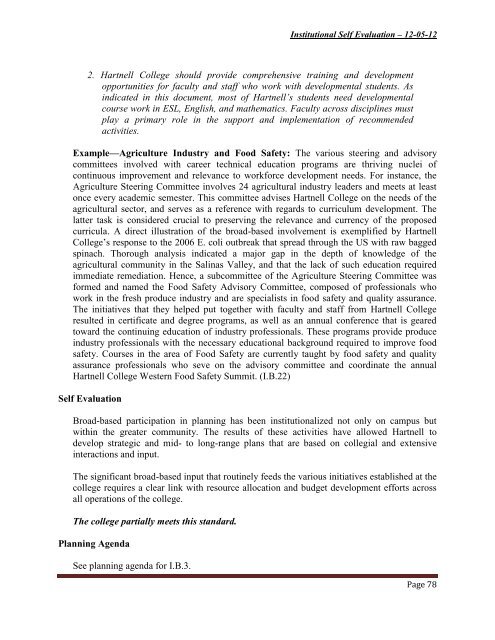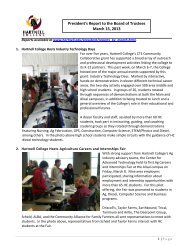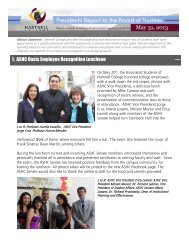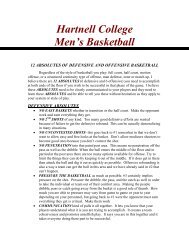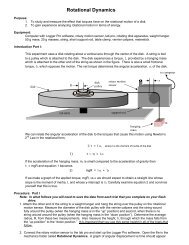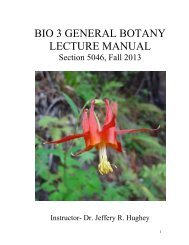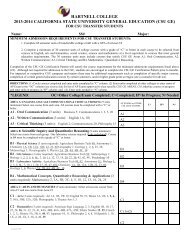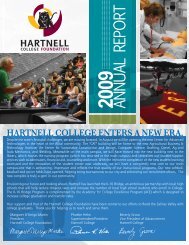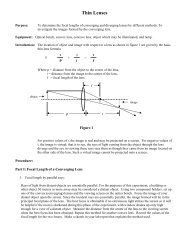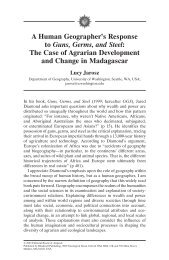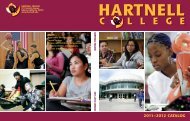- Page 1 and 2:
H A R T N E L L C O M M U N I T Y C
- Page 3 and 4:
Institutional Self Evaluation - 12-
- Page 5 and 6:
Institutional Self Evaluation - 12-
- Page 7 and 8:
Institutional Self Evaluation - 12-
- Page 9 and 10:
Institutional Self Evaluation - 12-
- Page 11 and 12:
Institutional Self Evaluation - 12-
- Page 13 and 14:
Institutional Self Evaluation - 12-
- Page 15 and 16:
Institutional Self Evaluation - 12-
- Page 17 and 18:
Institutional Self Evaluation - 12-
- Page 19 and 20:
Institutional Self Evaluation - 12-
- Page 21 and 22:
Institutional Self Evaluation - 12-
- Page 23 and 24:
Institutional Self Evaluation - 12-
- Page 25 and 26:
Institutional Self Evaluation - 12-
- Page 27 and 28:
Institutional Self Evaluation - 12-
- Page 29 and 30: Institutional Self Evaluation - 12-
- Page 31 and 32: Institutional Self Evaluation - 12-
- Page 33 and 34: Institutional Self Evaluation - 12-
- Page 35 and 36: Institutional Self Evaluation - 12-
- Page 37 and 38: Institutional Self Evaluation - 12-
- Page 39 and 40: Institutional Self Evaluation - 12-
- Page 41 and 42: Institutional Self Evaluation - 12-
- Page 43 and 44: Institutional Self Evaluation - 12-
- Page 45 and 46: Institutional Self Evaluation - 12-
- Page 47 and 48: Institutional Self Evaluation - 12-
- Page 49 and 50: Institutional Self Evaluation - 12-
- Page 51 and 52: Institutional Self Evaluation - 12-
- Page 53 and 54: Institutional Self Evaluation - 12-
- Page 55 and 56: Institutional Self Evaluation - 12-
- Page 57 and 58: Institutional Self Evaluation - 12-
- Page 59 and 60: Institutional Self Evaluation - 12-
- Page 61 and 62: Institutional Self Evaluation - 12-
- Page 63 and 64: Institutional Self Evaluation - 12-
- Page 65 and 66: Institutional Self Evaluation - 12-
- Page 67 and 68: Institutional Self Evaluation - 12-
- Page 69 and 70: Institutional Self Evaluation - 12-
- Page 71 and 72: Institutional Self Evaluation - 12-
- Page 73 and 74: Institutional Self Evaluation - 12-
- Page 75 and 76: Institutional Self Evaluation - 12-
- Page 77 and 78: BSI Improvement (%) Institutional S
- Page 79: Institutional Self Evaluation - 12-
- Page 83 and 84: Institutional Self Evaluation - 12-
- Page 85 and 86: Institutional Self Evaluation - 12-
- Page 87 and 88: Institutional Self Evaluation - 12-
- Page 89 and 90: Institutional Self Evaluation - 12-
- Page 91 and 92: Institutional Self Evaluation - 12-
- Page 93 and 94: Institutional Self Evaluation - 12-
- Page 95 and 96: Institutional Self Evaluation - 12-
- Page 97 and 98: Institutional Self Evaluation - 12-
- Page 99 and 100: Institutional Self Evaluation - 12-
- Page 101 and 102: Institutional Self Evaluation - 12-
- Page 103 and 104: Institutional Self Evaluation - 12-
- Page 105 and 106: Institutional Self Evaluation - 12-
- Page 107 and 108: Institutional Self Evaluation - 12-
- Page 109 and 110: Institutional Self Evaluation - 12-
- Page 111 and 112: Institutional Self Evaluation - 12-
- Page 113 and 114: Institutional Self Evaluation - 12-
- Page 115 and 116: Institutional Self Evaluation - 12-
- Page 117 and 118: Institutional Self Evaluation - 12-
- Page 119 and 120: Institutional Self Evaluation - 12-
- Page 121 and 122: Institutional Self Evaluation - 12-
- Page 123 and 124: Institutional Self Evaluation - 12-
- Page 125 and 126: Institutional Self Evaluation - 12-
- Page 127 and 128: Institutional Self Evaluation - 12-
- Page 129 and 130: Institutional Self Evaluation - 12-
- Page 131 and 132:
Institutional Self Evaluation - 12-
- Page 133 and 134:
Institutional Self Evaluation - 12-
- Page 135 and 136:
Institutional Self Evaluation - 12-
- Page 137 and 138:
Institutional Self Evaluation - 12-
- Page 139 and 140:
Institutional Self Evaluation - 12-
- Page 141 and 142:
Institutional Self Evaluation - 12-
- Page 143 and 144:
Institutional Self Evaluation - 12-
- Page 145 and 146:
Institutional Self Evaluation - 12-
- Page 147 and 148:
Institutional Self Evaluation - 12-
- Page 149 and 150:
Institutional Self Evaluation - 12-
- Page 151 and 152:
Institutional Self Evaluation - 12-
- Page 153 and 154:
Institutional Self Evaluation - 12-
- Page 155 and 156:
Institutional Self Evaluation - 12-
- Page 157 and 158:
Institutional Self Evaluation - 12-
- Page 159 and 160:
Institutional Self Evaluation - 12-
- Page 161 and 162:
Institutional Self Evaluation - 12-
- Page 163 and 164:
Institutional Self Evaluation - 12-
- Page 165 and 166:
Institutional Self Evaluation - 12-
- Page 167 and 168:
Institutional Self Evaluation - 12-
- Page 169 and 170:
Institutional Self Evaluation - 12-
- Page 171 and 172:
Institutional Self Evaluation - 12-
- Page 173 and 174:
Institutional Self Evaluation - 12-
- Page 175 and 176:
Institutional Self Evaluation - 12-
- Page 177 and 178:
Institutional Self Evaluation - 12-
- Page 179 and 180:
Institutional Self Evaluation - 12-
- Page 181 and 182:
Institutional Self Evaluation - 12-
- Page 183 and 184:
Institutional Self Evaluation - 12-
- Page 185 and 186:
Institutional Self Evaluation - 12-
- Page 187 and 188:
Institutional Self Evaluation - 12-
- Page 189 and 190:
Institutional Self Evaluation - 12-
- Page 191 and 192:
Institutional Self Evaluation - 12-
- Page 193 and 194:
Institutional Self Evaluation - 12-
- Page 195 and 196:
Institutional Self Evaluation - 12-
- Page 197 and 198:
Institutional Self Evaluation - 12-
- Page 199 and 200:
Institutional Self Evaluation - 12-
- Page 201 and 202:
Institutional Self Evaluation - 12-
- Page 203 and 204:
Institutional Self Evaluation - 12-
- Page 205 and 206:
Institutional Self Evaluation - 12-
- Page 207 and 208:
Institutional Self Evaluation - 12-
- Page 209 and 210:
Institutional Self Evaluation - 12-
- Page 211 and 212:
Institutional Self Evaluation - 12-
- Page 213 and 214:
Institutional Self Evaluation - 12-
- Page 215 and 216:
Institutional Self Evaluation - 12-
- Page 217 and 218:
Institutional Self Evaluation - 12-
- Page 219 and 220:
Institutional Self Evaluation - 12-
- Page 221 and 222:
Institutional Self Evaluation - 12-
- Page 223 and 224:
Institutional Self Evaluation - 12-
- Page 225 and 226:
Institutional Self Evaluation - 12-
- Page 227 and 228:
Institutional Self Evaluation - 12-
- Page 229 and 230:
Institutional Self Evaluation - 12-
- Page 231 and 232:
Institutional Self Evaluation - 12-
- Page 233 and 234:
Institutional Self Evaluation - 12-
- Page 235 and 236:
Institutional Self Evaluation - 12-
- Page 237 and 238:
Institutional Self Evaluation - 12-
- Page 239 and 240:
Institutional Self Evaluation - 12-
- Page 241 and 242:
Institutional Self Evaluation - 12-
- Page 243 and 244:
Institutional Self Evaluation - 12-
- Page 245 and 246:
Institutional Self Evaluation - 12-
- Page 247 and 248:
Institutional Self Evaluation - 12-
- Page 249 and 250:
Institutional Self Evaluation - 12-
- Page 251 and 252:
Approximately $9.7 million or 21% o
- Page 253 and 254:
The college meets this standard. Pl
- Page 255 and 256:
levels that support the college’s
- Page 257 and 258:
III.D.1.b Institutional planning re
- Page 259 and 260:
Assumptions are reviewed during the
- Page 261 and 262:
The institutional planning and asse
- Page 263 and 264:
The audit report includes a managem
- Page 265 and 266:
financial decision making process i
- Page 267 and 268:
III.D.3.a The institution has suffi
- Page 269 and 270:
and restricted funds; and to demons
- Page 271 and 272:
Planning Agenda None. III.D.3.d The
- Page 273 and 274:
III.D.3.g Contractual agreements wi
- Page 275 and 276:
III.D.4 Financial resource planning
- Page 277 and 278:
Standard III D: Evidence III.D.1 Ha
- Page 279 and 280:
Institutional Self Evaluation - 12-
- Page 281 and 282:
Institutional Self Evaluation - 12-
- Page 283 and 284:
Institutional Self Evaluation - 12-
- Page 285 and 286:
Institutional Self Evaluation - 12-
- Page 287 and 288:
Institutional Self Evaluation - 12-
- Page 289 and 290:
Institutional Self Evaluation - 12-
- Page 291 and 292:
Institutional Self Evaluation - 12-
- Page 293 and 294:
Institutional Self Evaluation - 12-
- Page 295 and 296:
Institutional Self Evaluation - 12-
- Page 297 and 298:
Institutional Self Evaluation - 12-
- Page 299 and 300:
Institutional Self Evaluation - 12-
- Page 301 and 302:
Institutional Self Evaluation - 12-
- Page 303 and 304:
Institutional Self Evaluation - 12-
- Page 305 and 306:
Institutional Self Evaluation - 12-
- Page 307 and 308:
Institutional Self Evaluation - 12-
- Page 309 and 310:
Institutional Self Evaluation - 12-
- Page 311 and 312:
Institutional Self Evaluation - 12-
- Page 313 and 314:
Institutional Self Evaluation - 12-
- Page 315 and 316:
Institutional Self Evaluation - 12-
- Page 317 and 318:
Institutional Self Evaluation - 12-
- Page 319 and 320:
Institutional Self Evaluation - 12-
- Page 321 and 322:
Institutional Self Evaluation - 12-
- Page 323 and 324:
Institutional Self Evaluation - 12-
- Page 325 and 326:
Institutional Self Evaluation - 12-
- Page 327 and 328:
Institutional Self Evaluation - 12-
- Page 329 and 330:
Institutional Self Evaluation - 12-
- Page 331:
Institutional Self Evaluation - 12-


